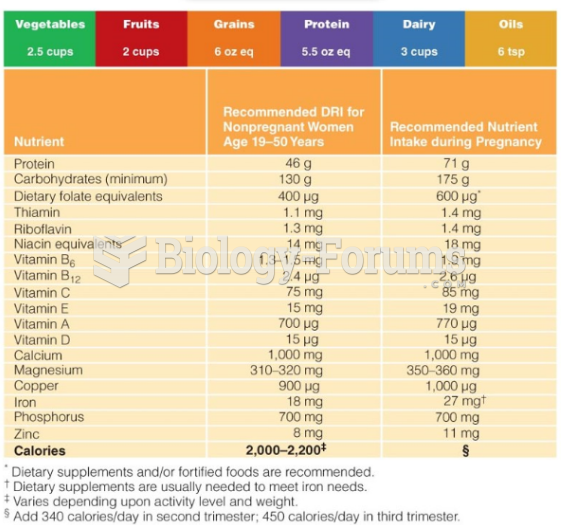Answer to Question 1
Times of intense development and rapid cell division are called critical periodscritical in the sense that those cellular activities can occur only at those times. If cell division and number are limited during a critical period, full recovery is not possible. Damage during these critical times of pregnancy has permanent consequences for the life and health of the fetus. The development of each organ and tissue is most vulnerable to adverse influences (such as nutrient deficiencies or toxins) during its own critical period.
The neural tube, for example, is the structure that eventually becomes the brain and the spinal cord, and its critical period of development is from 17 to 30 days of gestation. Consequently, neural tube development is most vulnerable to nutrient deficiencies, nutrient excesses, or toxins during this critical timewhen most women do not yet even realize they are pregnant. Any abnormal development of the neural tube or its failure to close completely can cause a major defect in the central nervous system.
Answer to Question 2
An estimated one-third of all pregnant women in the United States are obese (BMI > 30), which can create problems related to pregnancy, infancy, and childbirth. Obese women have an especially high risk of medical complications such as gestational hypertension, gestational diabetes, and postpartum infections. Compared with other women, obese women are also more likely to have other complications of labor and delivery. Complications in women after gastric bypass surgery are lower than in obese women, but their infants are more likely to be small, perhaps because of limited nutrient absorption; careful monitoring during pregnancy is advised.
Infants of obese women are more likely to be large for gestational age, weighing more than 9 pounds. Problems associated with macrosomia include increases in the likelihood of a difficult labor and delivery, birth trauma, and cesarean delivery, which presents a high risk in obese women. Consequently, these infants have a greater risk of poor health and death than infants of normal weight.
Of greater concern than infant birthweight is the poor development of infants born to obese mothers. Obesity may double the risk for neural tube defects. Folate's role has been examined, but a more likely explanation seems to be poor glycemic control. Undiagnosed diabetes might also explain why obese women have a greater risk of giving birth to infants with heart defects and other abnormalities.
Even moderate overweight increases the risks for some complications, such as gestational hypertension, gestational diabetes, preterm births, and cesarean deliveries; risks tend to increase as BMI increases. Health-care providers have traditionally advised against weight-loss dieting during pregnancy. Limited research, however, suggests that following a well-balanced, kcalorie-restricted diet and regular exercise program can support a healthy pregnancy with little or no weight gain. Ideally, overweight and obese women will achieve a healthier body weight before becoming pregnant and avoid excessive weight gain during pregnancy.







